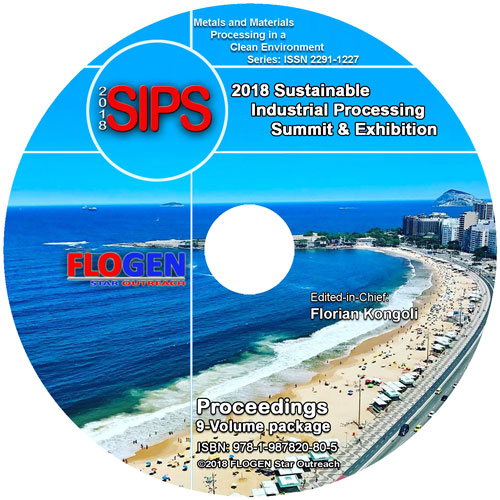2018-Sustainable Industrial Processing Summit
SIPS2018
Volume 6. New and Advanced Materials and Technologies
| Editors: | F. Kongoli, F. Marquis, P. Chen, T. Prikhna, N. Chikhradze |
| Publisher: | Flogen Star OUTREACH |
| Publication date: | 23 December 2018 |
| Pages: | 392 pages |
| ISBN: | 978-1-987820-92-8 |
| ISSN: | 2291-1227 (Metals and Materials Processing in a Clean Environment Series) |

CD shopping page
Development of Hybrid Reinforced Corrosion Resistant Polymer Concretes
Nikoloz Chikhradze1; Fernand Marquis2; Guram Abashidze1; Davit Tsverava3;1G. TSULUKIDZE MINING INSTITUTE, Tbilisi, Georgia; 2SAN DIEGO STATE UNIVERSITY, San Diego, United States; 3LEPL GRIGOL TSULUKIDZE MINING INSTITUTE/M.SC. STUDENT OF GEORGIAN TECHNICAL UNIVERSITY, Tbilisi, Georgia;
Type of Paper: Invited
Id Paper: 59
Topic: 43
Abstract:
Polymer concretes, unlike common concrete (produced based on cement, as cohesive material), are notable for high durability on compression 50-90 MPa, and especially, on tension 6-10 MPa, with unique corrosion resistance. However, they are also associated with negative properties, such as high creep deformability. Because polymer concretes work well on tension, their application is prospective for the production of shock resistant construction materials, but for this, strengthening by additional reinforcing mechanisms is necessary. In addition, because of differences in the durability and deformability on compression, as well as on tension, it is important to reinforce the polymer concrete's tensile and bended properties.
This work presents and discusses the reinforcement of polymer concrete by hybrid fibers. The major goal of this work is the production of such polymer concretes with high durability on tension and high shock resistance that preserves these properties under the effect of aggressive environments. The primary cohesive materials are unsaturated polyester resins, as polymers. The fiber reinforcements (coarse and fine) are primarily three types of basalt, polypropylene, two types of metal fibers, andesite and quartz, all selected for their chemical resistance and durability. The technological parameters for the production and processing of nano and ultrafine dispersive powders from rocks using vibration and planetary mills, and the physical and mechanical properties of these concretes are presented and discussed. The data on the corrosion resistance of these processed polymer concretes (corrosion resistance coefficient, diffusion coefficient of aggressive liquids, coefficient of liquids- sorption, and the coefficient of liquids penetration in the concretes) are also presented and discussed.